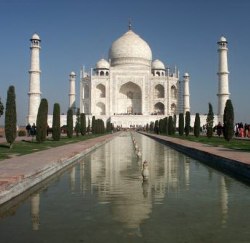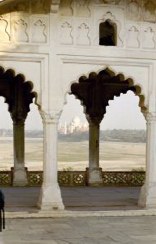The Taj Mahal
Travel The World
India - Taj Mahal, the Monument of Eternal Love


Images: Taj Mahal.
The Taj Mahal at Agra, seen from Agra fort which was the prison of the builder of the Taj Mahal, Shahjahan.
The visit to incredible India cannot be complete without experiencing its most spectacular piece of architecture --
the Taj Mahal, literally ‘the Crown Palace’. Its curving, gently swelling dome and the square base upon which its rests so lightly, surrounded
by four lofty minarets, is a familiar image in hundreds of travel brochures and travelogues on India.
This picture postcard image of the Taj, as it is lovingly called, does little justice to the legend, the poetry and the romance woven into its history.
Its beauty is eternal. It overawes, it mesmerizes, and it inspires. The Indian Nobel laureate Rabindranath Tagore aptly describes it as, ‘a teardrop on the cheek of time’.
Who built it and why?
The history of this famed monument is as fascinating as its architectural brilliance. The story goes that the Mughal Emperor Shah Jehan, reigning
over India in the fifteenth century, was married to Begum Arjumand Banu, better known as the beautiful Mumtaz Mahal. It was a match made in heaven
and the emperor, smitten by true love, never let the queen out of his sight.
He even took her on all his military campaigns! She bore him fourteen children, but, to his grief, died during childbirth. Emperor Shah Jehan was devastated
and wished to preserve the mortal remains of his everlasting love for posterity.
The monument he built in the memory of Mumtaz Mahal was of such exquisite beauty and elegance that today it is counted amongst the seven wonders
of the ancient world. As a mausoleum, it remains unmatched upon this earth; few mortal remains have ever been enshrined in greater grandeur.
How was it built?
This architectural marvel, designed by the Iranian architect Ustad Isa, was not built overnight. With no machines, modern tools or transport, it required a
hard labor of over twenty thousand workmen and master craftsmen to carve it out of stone and pure white marble. This top grade marble, brought from all
over India and Central Asia, required a fleet of over thousand elephants to transport it to the site. Little wonder it took twenty-two years to build this marvel!
The aesthetic sense of its creators and the skill of its stone carvers is a testimony to the great culture of Ancient India.
Why is it so great?
The moment you step inside the main sandstone gateway into the premises of the complex, you are likely to stop dead in your tracks, awestruck as you
first behold the Taj. This glistening virgin white structure, with its bulbous white dome mounted like a crown jewel, along with its tapering minarets, is sure
to take your breath away. Though it looks small and faraway, it actually stands only a little over nine hundred feet at the other end of the main entrance.
This clever optical trick is no coincidence, but deliberately designed to enhance the appeal of the monument. The path from the main gateway to the
monument is adorned with well laid out gardens on both sides and a long water channel in the middle that reflects the Taj Mahal in all its glory.
As you approach the mausoleum, it appears to grow in size. The dome, especially, seems to expand, almost as if it were
being slowly inflated. You realize the actual size of the building only when you reach the base. And what a colossus it turns
out to be! Towering almost two hundred feet in air, it looks majestic. The four minarets, each over a hundred feet tall with
elegant windowed cupolas, rise up from the corners of this plinth, giving the monument its characteristic look that continues
to endear it to the world.
The entry to the marble mausoleum is through its south-side portal. And as you approach it, you cannot help but notice its rich embellishments and detailed
craftsmanship. The arches of the portal are worth a look. The floral arabesques, ashioned from gemstones and inlaid in white marble stand in stark contrast to
the inscriptions from the Koran, impressively inlaid in the black marble. For the Muslims, these inscriptions are the word of God as revealed to Prophet Mohammad.
Those with a discerning eye would be amazed to
find the letters of the inscription maintain a consistent size from the bottom to the top, although the top of the arch is over hundred feet tall! How? Well, it is
another optical trick that ancient calligraphers have performed with amazing expertise. They created this illusion by gradually increasing the size of the letters
in relation to the distance from the eye. This ingenious trompe l'oeil effect is to be seen to be believed!
On crossing the portal, you immediately step into a spacious central chamber, octagonal in shape. All around this chamber
are two stories of eight interconnected rooms. In the days of yore, mullahs or the Muslim clerics chanted the Koran and royal musicians played soft melodies
from these rooms. At first glance, everything inside the domed mausoleum looks deceptively simple, an epitome of matchless purity and simplicity. But, on
closer inspection, the elaborate design slowly reveals itself.
The central chamber houses two tombs. In the center is the jewel-inlaid tomb of Queen Mumtaz Mahal and to its side is the casket of Emperor Shah Jehan.
The emperor’s casket is out of alignment because it was not catered for in the preliminary design, being an afterthought. The two tombs, though impressive,
are not original. The actual ones are right underneath in the basement and you can see them. This was probably done to provide privacy to the enshrined.
The refined inlays and rich surface details seen on the tombs and surrounding structures, echoes the fine quality of this monument. However, it is the superb manner in which all the
elements blend together and harmonize that most clearly brings to fore the great skills of its creators.
To get an idea of the aesthetics and fine craftsmanship of the Taj’s interiors, you just need to look at the marble partition that encloses the two tombs.
This fine mesh partition, carved out of a single piece of marble is inlaid with precious and semi-
precious stones. To show its full magnificence, the tour guide usually places a flashlight on one side of this mesh and makes
the inlaid gems gleam in myriad hues, spreading a surreal radiance all around. Little wonder this monument is said to have
been ‘built by Titans and finished by jewelers’!
What is its magic?
The Taj Mahal mesmerizes. And it is not only the alluring design and its interiors that appeal, but also its magnificent backdrop that manifests the varied
moods of the monument. The backdrop, provided by the vast plains of River Yamuna, and
the colors of nature give this monument an enchanting look. It acquires a pinkish hue under the first rays of the morning sun; appears milky white under
the glaring afternoon sun; and is set ablaze in golden tints by the setting sun.
However, it is the moonlight that brings its real beauty to the fore, making it sparkle like a diamond, as the embedded precious stones catch the glint of the moonlight.
This monument of eternal love continues to inspire lovers and poets down the ages. According to the poet, Sir Edwin Arnold,
“the Taj Mahal is not a piece of architecture, as other buildings are, but the proud passions of an emperor’s love
wrought in living stones”.